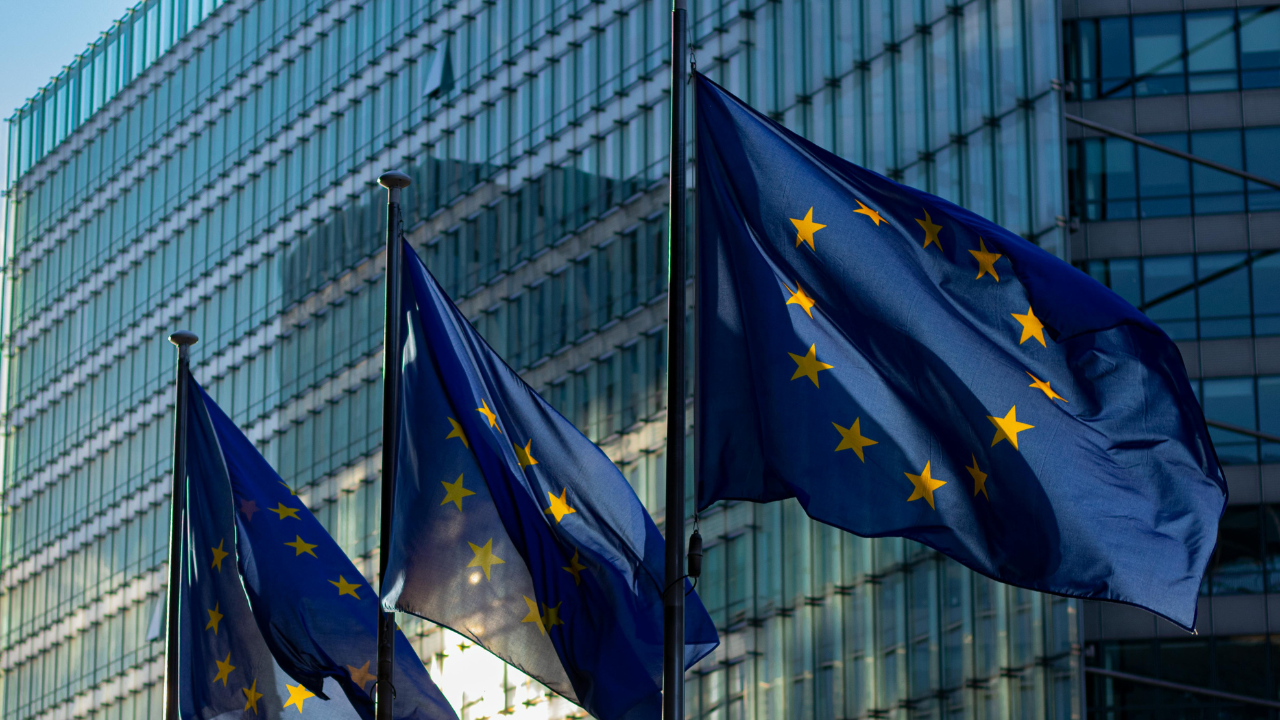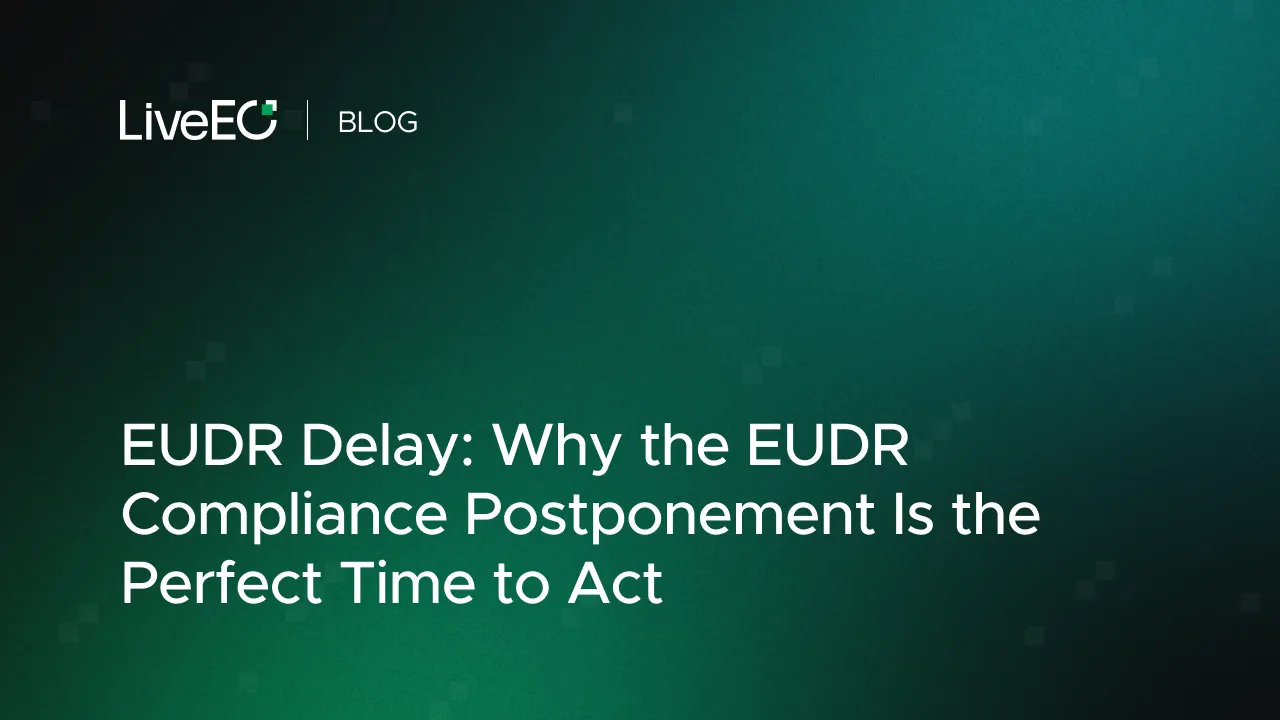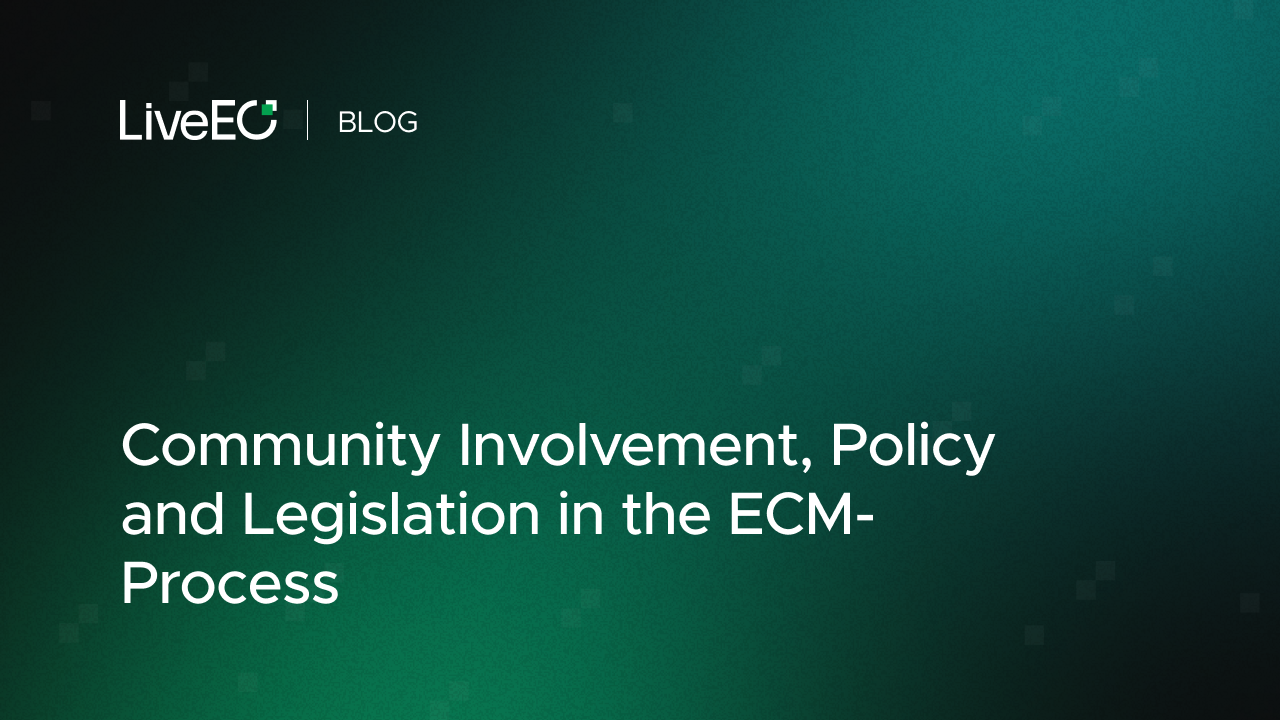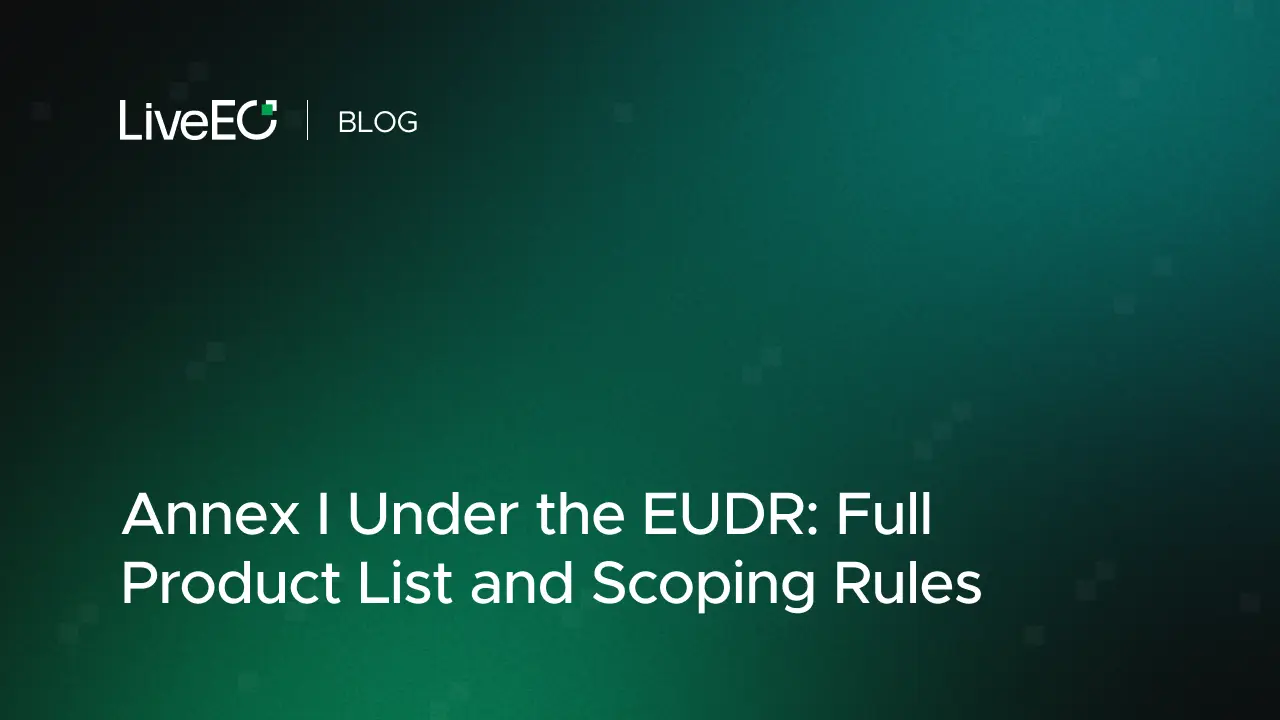
Originally set to apply from December 2024, the EU Deforestation Regulation (EUDR) has been officially postponed by 12 months.
On 19 December 2025, the European Parliament and the Council adopted Regulation (EU) 2025/2650, which amends the EUDR to adjust the timeline and simplify obligations.
The new enforcement date is 30 December 2026 for non-SME operators.Confirmed changes include an extension for micro and small undertakings until 30 June 2027, a simplified one-time declaration for micro and small primary operators, and a new "downstream operator" category with lighter reporting requirements.
These changes are now official law, but businesses should continue strengthening their EUDR compliance systems to ensure readiness ahead of the new enforcement dates.
EUDR Amendments Officially Adopted
On 19 December 2025, the European Parliament and the Council adopted Regulation (EU) 2025/2650, finalizing amendments to the EUDR.These changes are now final and officially in force.Key amendments include:
- Moving the general enforcement date to 30 December 2026 for most businesses.
- Extending the deadline for micro and small undertakings to 30 June 2027.
- Introducing a simplified one-time declaration for micro or small primary operators instead of full due diligence statements.
- Introducing a new "downstream operator" category; these operators and traders are no longer required to submit due diligence statements, but must register and maintain traceability records.
Non-SMEs are required to comply with the full set of EUDR obligations starting from 30 December 2026.
With the official adoption of Regulation (EU) 2025/2650 in December 2025, the previous 2025 deadline is no longer in effect.To sum up, the adopted regulation provides confirmed relief for SMEs and additional time for all operators, but businesses should not pause their compliance efforts.
The new enforcement timeline is now set in law.
What to Do Now: 3 Immediate Actions to Start Your EUDR Compliance Journey amid the EUDR Delay News
Despite the confirmed simplifications and extended timeline, the core obligations for non-SME operators remain robust, though they now apply from 30 December 2026. Businesses should use this time strategically by focusing on three essential actions to ensure EUDR readiness:
- Engage Your Suppliers Early
Begin discussions with suppliers about EUDR compliance, gather critical data, and set expectations for collaboration. - Audit Your Data Collection Process
Review and enhance your current data collection efforts to ensure that all legal documents and geolocation data are accurate and up-to-date. - Start System Integration
Implement or upgrade your compliance platform to ensure seamless integration with existing ERP and supply chain systems. This will make tracking compliance simpler as enforcement deadlines approach.
By taking these actions now, you’ll ensure your compliance strategy is ahead of schedule and that your supply chain is well-positioned for future success.
Don’t Pause Your Efforts: Why Early EUDR Compliance Still Matters
While some aspects of the EUDR have changed—such as the simplified obligations for downstream operators—the core requirements for larger operators remain intact, and enforcement is now scheduled to begin on 30 December 2026.
The current delay is not a pause in obligations but a strategic window for structured preparation.
The Competitive Advantage of Acting Early: Avoid Last-Minute Chaos
Starting compliance efforts early offers businesses several advantages and helps avoid the pitfalls of last-minute rushing. Acting now allows companies to:
- Secure supply chains and build stronger relationships with suppliers.
- Ensure uninterrupted access to deforestation-free products.
- Test systems and refine processes during the extra time provided by the delay.
By addressing potential risks early, businesses can ensure their compliance efforts are smooth and scalable. In contrast, companies that delay will face mounting pressure as the deadline approaches, making supplier engagement, data collection, and system integration more challenging under tight timelines.
Early action not only prepares businesses for regulatory requirements but also positions them as leaders in sustainable practices, resonating with eco-conscious customers and partners. Companies that act now will have robust systems in place by the time enforcement begins, gaining a clear market advantage while others scramble to catch up.
Even if simplifications are adopted, early compliance will remain a competitive differentiator, especially for suppliers aiming to partner with larger firms that must still meet full due diligence obligations.
Pressure from Enterprise Partners
Although the extension to 30 June 2027 for micro and small operators is now confirmed, many SMEs will still face earlier pressure from their larger enterprise partners.
Large companies, which must comply by 30 December 2026, will be looking for suppliers who can guarantee deforestation-free sourcing well in advance of the deadline.
Large companies, which must comply by 2025, will be looking for suppliers who can guarantee deforestation-free sourcing. SMEs that delay compliance risk losing valuable business relationships as enterprises seek out compliant partners to meet their own regulatory obligations.
Rather than waiting until the deadline, SMEs can benefit from early compliance by positioning themselves as reliable, future-proof partners for larger companies.
Early adoption not only ensures business continuity but also offers an opportunity to strengthen relationships with key partners, as enterprises will prioritize suppliers who have demonstrated their commitment to sustainability.
Three Critical Phases of EUDR Compliance: Why Acting Now Is Crucial
The EUDR compliance journey isn’t something that can be achieved overnight.
It involves multiple phases, each of which requires time, coordination, and meticulous attention to detail. With the delay in enforcement, businesses now have the opportunity to tackle these phases in a structured, strategic manner.
By acting now, companies can avoid the chaos of rushing through these steps at the last minute, ensuring that their compliance processes are robust and scalable.
The compliance journey consists of three critical phases—Supplier Engagement, Data Collection, and System Integration. Each phase comes with its own challenges, but starting now will allow you to move through them efficiently and without disruption to your supply chain.
Phase 1 – Supplier Engagement: The Foundation of Compliance
The first step in achieving EUDR compliance is getting your suppliers onboard, and this can be one of the most complex parts of the process.
Supply chains often span multiple tiers and regions, each with its own challenges related to regulations, operations, and technology.
Some suppliers, particularly smaller or regional ones, may lack the tools or knowledge to provide the accurate data required for compliance. One of the key challenges is ensuring that suppliers can provide verifiable geo-data to prove that their sourcing is deforestation-free.
For businesses working with suppliers in diverse or remote locations, this can be particularly tricky.
TradeAware simplifies the process by offering intuitive tools that help businesses engage with suppliers at every level, track their progress, and automate the validation of geo-data. By integrating satellite-based geolocation data, TradeAware ensures even suppliers in remote areas can provide accurate, real-time information, reducing the risk of incomplete or inaccurate data.
Phase 2 – Data Collection: Building a Robust Evidence Base
Once your suppliers are engaged, the next step is collecting the necessary data. This phase can take months, as it involves gathering legal documents, geolocation data, and ensuring that all required questionnaires are completed. The accuracy of this data is critical to ensure compliance.
TradeAware provides a comprehensive feature for collecting and validating this data, ensuring that it is both complete and compliant with EUDR requirements. By starting now, you can be sure that your data is accurate and ready when the regulation is enforced, saving time and avoiding compliance bottlenecks.
Read more about geolocation data collection.
Phase 3 – System Integration: Ensuring Seamless Operations
The final phase involves integrating compliance platforms with existing systems, such as ERP or supply chain management tools.
Depending on the complexity of operations, this could take several weeks or even months. The delay offers an ideal opportunity to ensure compliance platforms are fully integrated and operational well before the regulation takes effect.
System integration is crucial for ensuring that compliance data is automatically tracked and updated as the supply chain evolves. TradeAware, through its newly launched TradeAware API, enables seamless integration by allowing businesses to connect their internal systems with ease.
The API delivers real-time compliance data directly into existing workflows, automating critical compliance tracking and ensuring businesses stay up to date with regulatory requirements effortlessly.
Learn more about How to Comply with EUDR Requirements Using Your Existing Supply Chain Systems.
Why Sustainability and Compliance Go Hand-in-Hand
With EUDR enforcement rescheduled for December 2026, and confirmed simplified obligations for downstream actors, the delay offers a valuable opportunity to align compliance efforts with sustainability goals.
Meeting regulatory requirements doesn’t only ensure legal compliance, it also positions your business as a leader in sustainable practices. Compliance and sustainability are no longer separate efforts.
Companies that use this time to align their sourcing practices with environmental responsibility will be better positioned to meet the growing demand for ethical business operations.
Turn Compliance into Brand Equity
Compliance is no longer just a regulatory necessity, it’s a powerful tool for brand differentiation.
Companies that proactively align their supply chains with EUDR requirements can signal to the market that they are leaders in sustainability. Early compliance sends a strong message to customers, partners, and investors that your business is committed to protecting the environment and ethical sourcing practices.
Building your brand around early compliance strengthens your reputation as a sustainability-focused business. This, in turn, can enhance customer loyalty, drive new business opportunities, and attract investment from those prioritizing ESG (Environmental, Social, and Governance) principles.
The Long-Term Benefits of Compliance
Beyond the immediate need for EUDR compliance, early adoption brings significant long-term benefits. Early compliance strengthens your company’s overall ESG performance, which is a key metric that investors, partners, and stakeholders focus on. This proactive approach can help you attract ESG-conscious investors and build lasting trust with customers who value responsible sourcing.
By integrating sustainable practices early, your supply chain becomes:
- More resilient and adaptable to future regulatory shifts.
- A strong foundation for growth in a market that prioritizes ethical sourcing.
Act Now to Stay Ahead of the Curve
The delay in EUDR enforcement gives companies a unique opportunity to get ahead, but only if they act decisively.
Businesses that take advantage of this extra time to optimize their compliance strategies will emerge as industry leaders when the regulation goes into effect. Those who wait risk losing ground to competitors who have already secured their supply chains.
Leverage TradeAware to Streamline Your Compliance Journey
Navigating EUDR compliance can be complex, but TradeAware makes the journey smoother and more efficient.
Our platform is designed to simplify all three critical phases of compliance we mentioned above: supplier engagement, data collection, and system integration.
By automating these processes, TradeAware ensures that your team can focus on what matters most—building a resilient, deforestation-free supply chain.
- Supplier Engagement: TradeAware’s tools streamline outreach across all tiers of your supply chain, ensuring that suppliers are onboarded quickly and efficiently. With seamless communication and support, you can engage with suppliers in a structured way, collecting accurate and timely data. Learn more about TradeAware’s Commercial Network.
- Data Collection: Gathering and validating geo-data and legal documents can take months, but with TradeAware’s centralized platform, this process is accelerated. The platform organizes and validates data submissions, ensuring that everything is compliant and ready for future audits.
- System Integration: One of the most time-consuming aspects of compliance is integrating new systems with your existing ERP or supply chain management tools. TradeAware simplifies this integration, ensuring that your compliance data is fully connected to your operational systems, making tracking and reporting seamless. Learn more about TradeAware’s integration capabilities here.
By leveraging TradeAware, you can turn a complex, time-consuming process into a streamlined workflow that’s easy to manage and scalable. This gives your business the confidence and agility to meet EUDR requirements without the stress of last-minute preparations.
EUDR Delay: Next Steps
The adopted amendments and the 12-month delay provide businesses a unique chance to prepare.
Now that the changes are formally adopted via Regulation (EU) 2025/2650, the December 2026 deadline applies to non-SME operators.
Staying ahead now ensures a smoother path to compliance, and positions your company as a trusted partner in sustainable trade.
Whether you’re just beginning your compliance journey or refining your systems, now is the time to act. TradeAware’s team of specialists is here to provide the expertise and support you need to navigate the complexities of EUDR compliance confidently.
We're Here to Guide You
At TradeAware, we understand that EUDR compliance can feel overwhelming, but you don’t have to go through it alone.
Our experts can guide you through each phase of the compliance process, ensuring that your systems are fully prepared well before enforcement deadlines arrive. With our personalized support, you’ll be able to focus on running your business while we handle the compliance details.
Secure Your Supply Chain’s Future Today
The EUDR delay provides a strategic opportunity to get ahead, but businesses must not lose momentum in preparing for the December 2025 enforcement.
Contact us and receive personalized guidance to streamline your compliance process, safeguard your business relationships, and build a resilient, deforestation-free supply chain. The time to act is now. Ensure your business is fully prepared for the EUDR before it’s too late.








